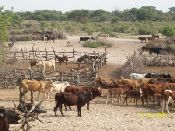|
The area and people
This site is subjected to problems of movement of mass due to the strong rains and of the drought, that causes the disappearance of the rain fed crops, the soil erosion and the drying out of wells.
Added value of DESIRE for stakeholders
The time spent on the ground allows establishing a reliable relation between the researchers and the local stakeholders. This ensures that the strategy which to be tested will be really wanted by the local people.
Study site stakeholder workshops
About forty persons participated to the workshop. Were present, farmers, breeders, representatives of OCB, local elected representatives (2 representatives, technicians water and natural resources of 3 municipalities), a representative of the ministry of agriculture and one NGO (the OMCV). During the workshop, the researchers felt a big expectation of the local populations. Made mobilize these actors gives them a moral obligation as for the results of the DESIRE project.
Limitations for spontaneous implementation of soil and water conservation practices
The solutions are too expensive for these poor populations. Absence of a public policy currently, there was a strong implication of the state since 10-15 years but they didn’t maintain their buildings.
Stakeholder groups
Government/Project staff
- National: researchers from INIDA and Uni CV
- Local: Municipalities and local delegation of MADRRM
- Municipality of São Domingos
- Municipality of São Lourenço dos Órgãos
- Municipality of Santa Cruz
- Delegation of the Ministry of Agriculture of São Domingos
- Delegation of the Ministry of Agriculture of Santa Cruz
Public administration
- agriculture is under the responsibility of DGASP
- forestry is under the responsibility of DGASP
- land is under the responsibility of DGASP
- water is under the responsibility of INGRH
- livestock is under the responsibility of DGASP
- environment is under the responsibility of DGA
Research Centers and Universities
- INIDA, Uni CV; University of Jean Piaget
NGOs / Community based organizations
- Several Non Governmental and Community-based Organizations are engaged in the issues related to environmental management. Some of them are:
|
Nº
|
Non Governmental Organizations
|
Target zone
|
| 1 |
The Friends of Nature
|
São Vicente Island |
| 2 |
ADAD - Association for Environment Defense and Development
|
National |
| 3 |
Garça Vermelha (Heron Purple) |
Santiago Island |
| 4 |
Capverdian Women Organization - OMCV |
National |
| 5 |
Citi Habitat |
National |
| 6 |
MORABI (Association of Women’s Self-promotion and Development) |
National |
| 7 |
ACACEA |
National |
| 8 |
OASIS (Organization of Rural Associations of Santiago’s Island) |
Santiago Island |
| 9 |
Sol & Vento (Sun & Wind) |
National |
| 10 |
Fórum Permanente para a Educação/Desenvolvimento (Permanent Forum for Education/Development) |
National |
| 11 |
AJOPOP (Association of Population Reporters) |
National |
| 12 |
OAF (Organization of Rural Associations of Fogo’s Island) |
Fogo Island |
| 13 |
CARITAS |
National |
| 14 |
OADISA (Organization of Rural Associations of Santo Antão’s Island) |
Santo Antão Island |
| 15 |
Bornefonden |
National |
| 16 |
Platform of NGOs |
National |
Media (journalists):
- AJOPOP (Association of Population Reporters)
- Rural Television and radio program – Há mar há Terra
Schools: There are several schools (EBI and High schools) in the study site
Land users (Groups of land users organized in local Association)
- Ago Longueira
- Agro Orgãos
- Agro Laje
- Agro Montanhinha
- Agro Orgaos Pequeno
- Agro Amo Bom
- Agro Banana
- Agro Godim
- Agro São Cristovão
- Agro Ribeira Seca
- Agro PRI Seca
Sustainability goals
| Goal 1 |
Stop soil erosion, decreasing the loss of soil and runoff in the steep slopes |
| Goal 2 |
Recovery of soil fertility and increase productivity in the long-term |
| Goal 3 |
Improvement of soil characteristics (water storage capacity, depth of top soil, organic matter content) |
| Goal 4 |
Decrease of slope gradient |
| Goal 5 |
Improvement of water and soil quality downstream -Stop the salinization |
| Goal 6 |
Improvement of water catchments, decreasing runoff |
| Goal 7 |
Improvement of plant cover |
| Goal 8 |
Achievement of community awareness regarding the necessity for soil and water conservation |
Source: expert estimate, study site leader, policy documents, field visit, research results.
|



